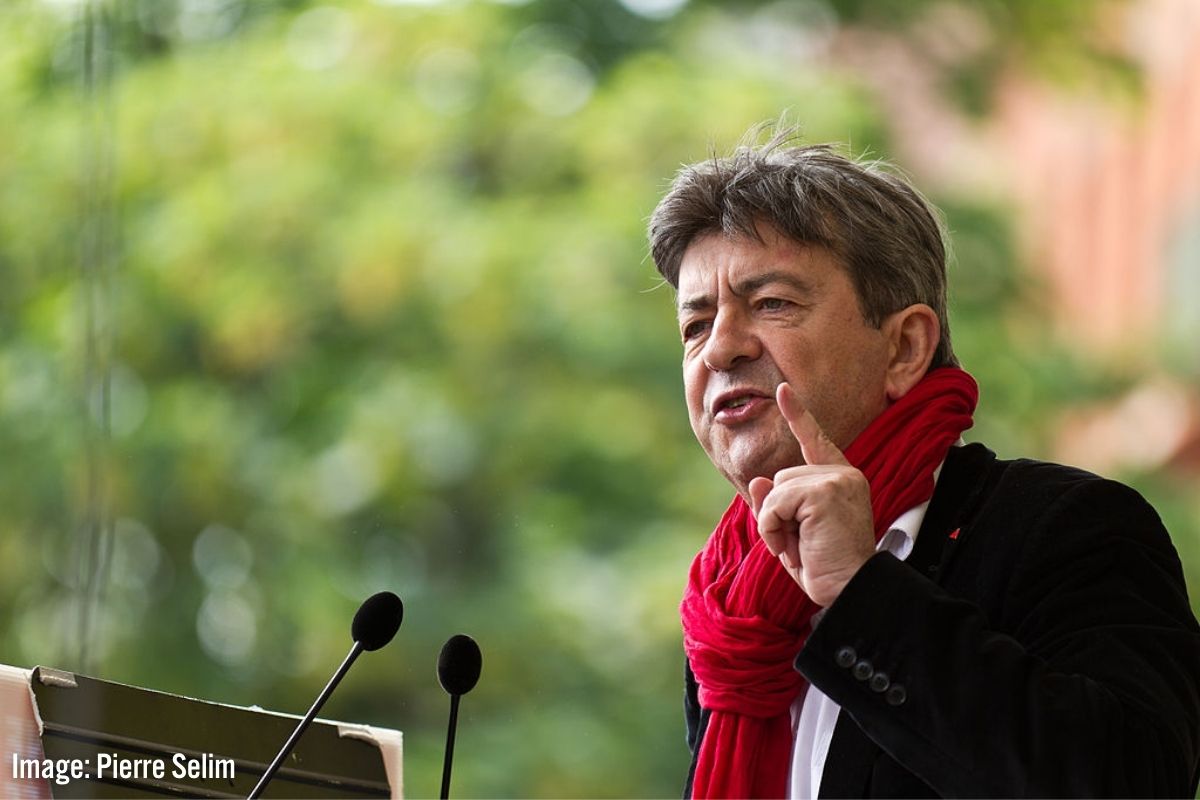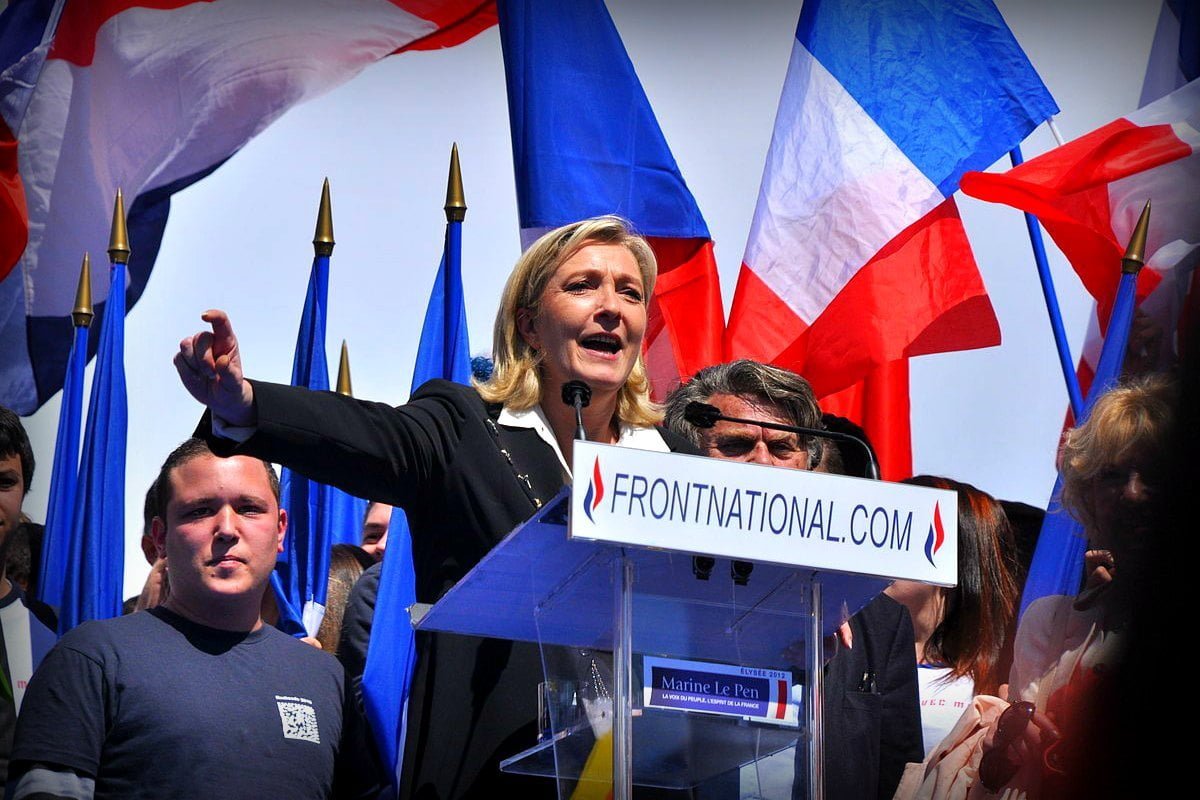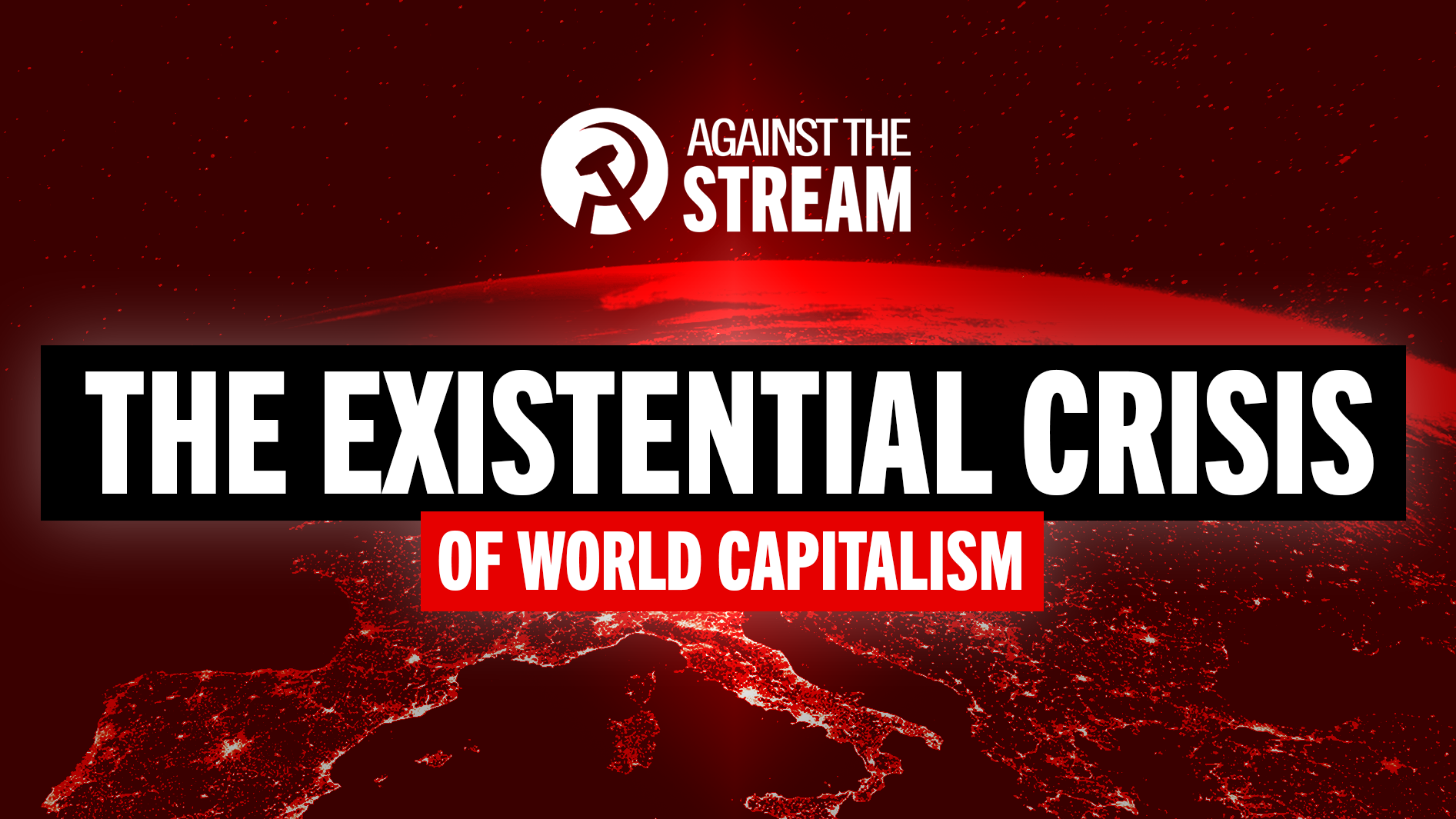The second round of the French presidential elections present workers and youth with the “choice” between a banker and xenophobe. Neither offers any alternative for the working class. The focus must now be on transforming the Rebellious France into a mass political movement that fights to break with capitalism.
The results of the first round of the presidential election have opened up a new phase of the political crisis in France. As in April 2002, the second round will be between the right and the far right. But much has changed since then. The economic crisis of 2008 has taken place. The probable victory of Emmanuel Macron, in two weeks time, will not lead to the relative political stability that Chirac benefited from in the wake of his victory in May 2002.
The political realignment taking place opens a period of major uncertainty and instability. The legislative elections in June will be the first illustration of this. There is no guarantee that they will give the head of state a strong parliamentary majority.
No to the so-called “Republican Front”!
The bourgeoisie, its politicians and media outlets are all relieved: they avoided “the worst”, from their point of view – namely Jean-Luc Mélenchon going into the second round. Now they are going to form a vast “republican” chorus calling for a vote for Macron to “block the National Front.”
The leaders of the Socialist Party, the Greens, and the Communist Party are all putting forward the same slogan. We reject it because it is absurd and counterproductive. It is the crisis of capitalism, mass unemployment, and the reactionary policies of successive governments that explain the growing success of the “anti-system” demagogy of the National Front (FN).
Macron proposes to pursue and step up the programme of austerity and attacks carried out by Hollande and Sarkozy: the massive destruction of civil service jobs; destruction of the Labour Code; dismantling of public services; tax breaks and subsidies of all kinds for the benefit of the big capitalists, etc. Throughout the campaign, Macron hid his programme under a “centrist” veil and a plethora of vacuous soundbites. But he is entirely devoted to the interests of the ruling class, which demand a drastic policy of austerity.
Among the voters of the FN there are many workers and unemployed who are enraged by the economic crisis and the corruption of the traditional political elite. Over the past 30 years, they have seen the rise of right-wing and left-wing governments, which have led to the implementation of the same anti-worker policies.
Marine Le Pen relies on this concrete experience when denouncing the collusion of the “establishment parties”, starting with the Socialist Party and the Republicans. This is the meaning of her attacks on the “UMPS” [describing the Republicans (the former UMP) and the Socialists (PS) as one and the same], a formula that is resonating with some of the most exploited and oppressed sections of the population, because it corresponds with the reality of their own experience.
In this context, the “Republican Front against the FN”—ranging from Pierre Laurent (the leader of the Communist Party) to François Fillon (the Republican candidate in the first round)—is denounced by Marine Le Pen and her acolytes as a new manifestation of the “UMPS”. They say, “See, all those parties of the Establishment are abandoning their pseudo-differences and uniting against us. This is the proof that we are shaking the system and that we are its true opponents!” This is the primary result of the calls from the “left” to vote for Macron. It is a serious mistake, particularly unacceptable on the part of the leaders of the Communist Party (PCF), and is rightly causing dissatisfaction in the ranks of the party.
Jean-Luc Mélenchon announced that 450,000 supporters of the France Insoumise (Rebellious France, FI) would be consulted on the position to be adopted for the second round. They can vote online until Tuesday 2nd May at midday by choosing between three options: 1) spoil the ballot; 2) vote for Macron; 3) abstention. We are taking part in this consultation and call for an abstention.
The FN is a dangerous enemy that must be fought. But we do not fight a fire by voting for the arsonist. The labour movement must fight the FN with its own methods and on the basis of a radical left programme which tackles the root of the problem: the control of the economy by a handful of extremely wealthy parasites. In the days to come, the political and trade union organisations of the labour movement must organise mass mobilisations in the street against the right and the extreme right. May Day must take place under the banner of the fight against the reactionary programmes of Le Pen and of Macron. The trade union leaders should put on the agenda a 24-hour general strike.
Enormous success of the Rebellious France (FI)
The progression of Macron and Le Pen to the second round must not overshadow the major event of this presidential election, namely the enormous success of the campaign of Jean-Luc Mélenchon, which received three million votes more than in 2012. His performance is the continuation of a series of upheavals that have recently marked the European (SYRIZA, Podemos, Corbyn) and American left (Sanders). This is an international phenomenon with a clear meaning: a growing number of young people and workers are looking for a left-wing alternative to the crisis of capitalism and to politicians who have been in power for decades without changing anything, or changing it for the worse.
The deep crisis of the capitalist system leads to political polarisation—to the right, as shown by the FN result, but also towards the left.
The electoral collapse of the Socialist Party (PS) is a striking illustration of this. Benoit Hamon has paid the price for the labour law and austerity policies of the Hollande government. He also pays for his own moderation and two years of participation in government. At the end of the PS primaries, Hamon could have relied on his clear victory to launch an offensive against the right wing of his own party. He preferred to seek a “central” position. As a result, he found himself in the middle of a chasm.
Mélenchon’s campaign has generated enormous enthusiasm among large sections of the population. In particular, the number of young people present at the meetings of the Rebellious France was impressive. 30% of voters aged 18 to 24 eventually voted for Mélenchon!
This radicalisation of the youth—which is also an international phenomenon—will have profound and positive consequences for the future of the Left. In this respect, one of the tasks for the coming months is to organise the mass of the “rebellious” into a democratically structured party. This is the best way of consolidating and developing the Rebellious France movement, and of attracting under its banner the most militant elements of the youth and of the working class.
In the immediate future, we must mobilise to give the Rebellious France the widest representation in the National Assembly in June. The game remains very open. We must build on the powerful momentum of the past few months to develop a militant campaign nationwide. Mélenchon achieved excellent results in many cities throughout the country, including Lille (29.9%), Toulouse (29.2%), Montpellier (31.5%), Marseille (24.8%), Rouen 26%), Nantes (25.5%), Le Havre (29.8%), Strasbourg (24.4%), Lyon (22.9%), and Bordeaux (23.4%). He comes close to or exceeds 30%—sometimes even 40%—in many medium-sized cities with a high concentration of workers, especially in the suburbs of Paris. These figures highlight the colossal potential of the Rebellious France.
In Spain, “Unidos Podemos” has gained a strong presence in parliament (71 seats). But the PSOE (the Spanish Socialist Party) has not experienced a collapse on the electoral level comparable to the one suffered by the French Socialists. In the legislative elections of December 2015, the PSOE still won 22% of the vote and by doing so it managed to retain 90 seats (of the total 350). In France, the PS share of the vote collapsed to 6.4% on April 23. Now the PS is going to engage in alliances with Macron’s “En Marche”, that is, with an objectively right-wing movement. This situation will inevitably open up an even greater space for the candidates supported by the Rebellious France, which would represent one reason more not to call for a vote for Macron in the second round of the presidential election.
Break with capitalism!
 Révolution has supported the candidacy of Jean-Luc Mélenchon since the launch of the Rebellious France in February 2016. We are part of this movement. The emergence of a powerful left-wing alternative to the PS is a very positive development, to which we are committed.
Révolution has supported the candidacy of Jean-Luc Mélenchon since the launch of the Rebellious France in February 2016. We are part of this movement. The emergence of a powerful left-wing alternative to the PS is a very positive development, to which we are committed.
At the same time, we believe that the debate on the programme of Rebellious France should continue. It is a progressive programme, the implementation of which would potentially lead to a very significant rise in living standards for the vast majority of the population. But there is a problem: this programme is not possible in the context of capitalism in crisis. The big capitalists would resort to all their power to prevent it from being implemented.
We had a very clear idea of what that means during the last two weeks of the campaign for the first round, when Mélenchon’s rise in the polls earned him savage attacks, around the clock, by the supposedly “free and independent” mass media. They have evoked the spectre of a recession. The powerful were showing their readiness to pack up their wealth and leave the country. These were not just examples of pressure, but implicit threats. If Mélenchon had qualified for the second round, the capitalists would have immediately threatened to remove their future investments in the French economy in an act of blackmail for the continuation of a policy of counter-reforms and budget cuts.
To those who tell us that austerity is the only policy compatible with capitalism in crisis, we must answer: precisely, the struggle for progressive reforms must go hand in hand with the struggle against capitalism itself; for expropriation of the main means of production; for the socialist transformation of society!
It is necessary to complete the programme of the Rebellious France by incorporating within it measures aimed at breaking the economic power of the ruling class.
For mass mobilisations in the streets against Le Pen and Macron!
For a 24-hour general strike!
Mobilise for a “rebellious” National Assembly!
For a programme that breaks with capitalism!
Youth protests across France: “Neither the banker, nor the racist!”
By Vince Murray
Since Thursday, students and youth in Paris, Rennes, Nantes, Toulouse and other cities across France have held rallies and marched through the city streets. The protests were against the right wing nationalist Marine Le Pen and the liberal Emmanuel Macron who are facing off in the in the second round of the presidential election.
In total, more than 3,000 high school students took to the streets carrying signs exclaiming: “Neither the banker, nor the racist!” and “The real anti-establishment, that is us!” Political slogans could be heard through the streets as students chanted “It is not the immigrants who should be expelled, it is Marine Le Pen!”, “Macron, Le Pen, we do not want them!”, “Their elections, our future!”
During many of the protests, the youth were met by armoured police blocking the marches and dispersing tear gas canisters into the crowds, while surveillance helicopters could be seen in the sky above. One police officer in Rennes even resorted to drawing his pistol and for a brief moment aiming it at the protesters.
In Paris, gathering at Place de la Republique the protest moved towards Boulevard Beaumarchais, where the tension rose between police and students. Anouk, a 16 year-old Parisian student from Lycée Buffon explains how the protests were organised as a peaceful sit-in by high school students from all over Paris. She said: “We disagree with the values put forward by the National Front, and since we do not have the right to vote, we have to express ourselves differently”.
In Lyons the protests escalated as well. Students hung banners on the gates of the town hall, where one read: “By my acts I vote 365 days a year. You who come out only 2 Sundays every 5 years, just vote as you see fit.” At the end of the rally, demonstrators left the Place des Terreaux shouting “down with capitalism”. A group of youths then wanted to cross one of the city-bridges to join the protest on the other side of the river, but were arrested by the police who fired tear gas at them.
The protests across France come after years of political frustration among youths and workers. Current president François Hollande and the French Socialist Party have, despite their promises, implemented countless austerity policies and allowed companies to cut workers’ salaries. Meanwhile, youth unemployment still stands at 24.6%. For this, Hollande and the Socialist Party have paid the price, with the party in a deep crisis and their candidate, Benoît Hamon, securing only 6.4% of the votes in Sunday’s first round election. As the last part of the presidential race now pits a racist right-winger against an ex-banker, the frustration among those who face tough conditions continues to increase.
With left-wing candidate Jean-Luc Mélenchon out of the presidential race, the workers and youth of France only have more capitalist policies of austerity and attacks on living conditions to look forward to. The crisis of French capitalism has, like in many other European countries, expressed itself through a massive political polarisation to the left and to the right. The traditional parties of the establishment, which the ruling class have relied upon for decades, are all in deep crises of legitimacy. The rise of Le Pen to the right and Melenchon to the left is an indication of this process. But the recent protests indicate that a layer amongst the youth are drawing even more radical conclusions. Many of these young people see the crises facing society not only as a result of poor political decision-making, but as a result of the capitalist system. They see no future within the confines of this system and correctly distrust all representatives of the ruling class.
Protests like the ones across France this week show just how fed up many students and workers are with austerity, lies upon lies from politicians and the capitalist system in general. Mélenchon’s massive success, where 30% of voters aged 18 to 24 voted in favor of his movement, is a sign of the potential for radical movements in the next period. The youth who took to the streets this week are reflecting the brewing mood under the surface, and anticipating future developments within the wider youth and the working class. There are undoubtedly more protests on the way and for the workers and youth of France it will only become clearer that the problems facing France, Europe and the entire world cannot be solved within the limits of capitalism. The only solution, as many young people are realising, is “Neither the banker, nor the racist!” but to break with the capitalist system and expropriate the means of production to create a truly fair society.
Le cortège de lycéen a quitté la place de la République et est maintenant à la bastille. #BlocusNiFnNiMacron pic.twitter.com/Lr1BDxkAmy
— L’Obs (@lobs) April 27, 2017






